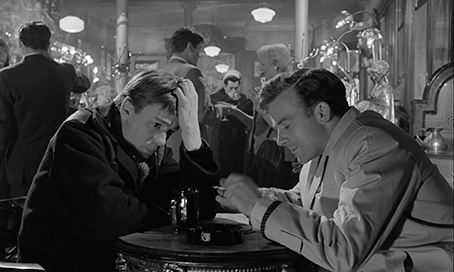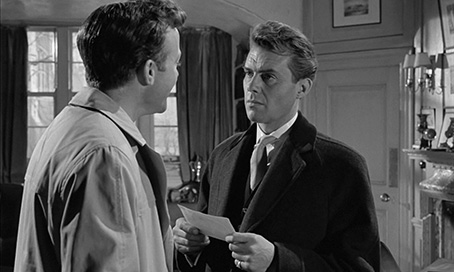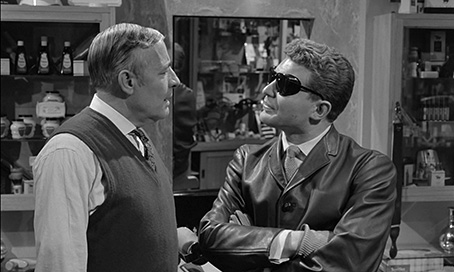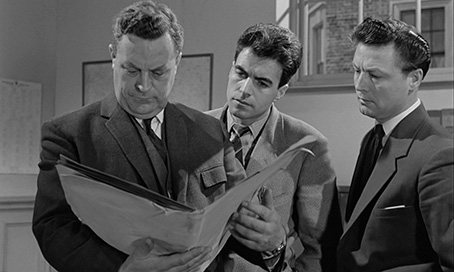|
The 1961 film Victim opens in the manner of a briskly paced crime movie of the sort that Britain was once so good at. Under the opening credits, the police roll up at a building site and young Jack 'Boy' Barrett (Peter McEnery) immediately stops what he's doing and scarpers. He quickly phones his friend and roommate Eddy (Donald Churchill) and asks him to bring a package to an arranged meeting place. Eddy willingly complies and narrowly dodges the police when they turn up at his boarding house looking for Jack, whose repeated attempts to contact celebrated barrister Melville Farr (Dirk Bogarde) are either ignored or rebuffed. There's no doubt about it, Jack's in trouble for something. The question is what? Subtle hints that you'll need to know your social history to pick up on are provided when Jack chances upon his friend Frank (Alan Howard) and tries to tap him for somewhere to sleep or for money to aid his escape. Frank is happy to help to help but his girlfriend Sylvie (Dawn Beret) reacts with hostility to Jack's appearance. "Why can't he stick with his own sort?" she snaps. What, exactly, could she mean by that? A further clue is provided a short while later when the sympathetic Frank says to Jack, "Well it used to be witches. At least they don't burn you."
Arrested and interrogated by the firm but sympathetic Detective Inspector Harris (John Barrie) and his younger and pushier sidekick Bridie (John Cairney), Jack admits to embezzling money from the building firm but refuses to say what he spent it on. Harris suspects he is being blackmailed, but Jack is saying nothing beyond his admission of guilt for carrying out the theft. It's when Harris contacts Farr and shows him the scrapbook that Jack was trying to destroy at the time of his arrest that the film shows its hand, and with a directness that must have been startling back in 1961. The scrapbook is a collection of articles on Farr, who admits to knowing Jack, whom he occasionally gave a lift to but began avoiding when the boy seemed to be fixating on him. "You knew, of course, that he was a homosexual" Harris asks, to which Farr calmly replies, "I had formed that impression." This is early 60s England, when homosexuality was a criminal offence and gay men were prime targets for blackmail and exploitation. Farr asks if he can speak to Jack and is shocked by the news that the young man has since hung himself in his cell. Farr becomes determined to track down the people he believes drove Jack to suicide, and becomes all too aware of the risk he is taking when he discovers that the photo that was used to blackmail Jack also implicates him.

It may seem absurd, at least from a hopefully more tolerant modern perspective when no TV soap is complete without at least one openly gay character, that homosexuality was once a crime in the UK. I am well aware that there are a fair few out there who still think it should be and who shudder with horror at the very idea that anyone could be attracted to someone of the same sex, and at the risk of offending people I have absolutely no time or respect for, they really need to get their heads out of their arses. Of course, these are people who will tell you that such desires are unnatural and are actually the result of the corrupting influence of the likes of literature and film. Which is, of course, complete and utter nonsense. Sexual attraction cannot be learned from a magazine or a movie, it's part of our genetic make-up, and the idea that there could not be variations to the so-called biological norm during the mind-bogglingly complex process in which a a single egg and sperm repeatedly divide and grow into a living human being is patently absurd – the genetic code for attraction to either gender is right there at the start of this process, not something injected into a child when it pops out of the womb. And this is not a specifically human trait – homosexual behaviour has been observed and recorded in a range of animal species from Dolphins to Dragonflies. Try telling them they were corrupted by television.
There's no doubt that for many the idea of engaging in a sexual relationship with someone of their own gender is unthinkable. The desire is not there, and without desire, sex is no more than a mechanical act or a cruel exercise in power. This matters not. There is no requirement for those of a heterosexual inclination to have a homosexual relationship to gain their citizenship badge. Each to his own, as the saying goes. The problem comes when people in positions of power dislike the idea of same-sex relationships so vehemently that even the thought that others might be so inclined repulses and angers them, often to such a degree they want to eradicate its existence. So they pass draconian laws and write damning clauses into religious doctrines, splash false and furious headlines across tabloid newspapers and take to the streets to beat anyone they suspect of such unclean behaviour to a bloody pulp. And these people are allowed to vote and drive cars.

Of course, the irony is that a significant number of those responsible for propagating and enforcing such frankly perverse attitudes over the years have later proved to be closet homosexuals themselves. A few years ago, a gay friend of mine used to break into the broadest of smiles whenever he heard anti-homosexual rhetoric being spouted by politicians who had been to public school (an ex-public schoolboy himself, he was bristling with revealing stores on this score). And I can't be the only one who enjoyed a smug smile when it was revealed that Martin Webster, the once leading light of the gay-hating and far right National Front, was expelled from the party following accusations that he was homosexual. He later stoked these rumours by claiming that he had once enjoyed a four-year affair with equally right-wing and gay-hating BNP leader Nick Griffin.
Back in 1961, what the legal system liked to imprecisely define as 'homosexual acts', at least between consenting males, were still criminalised in the UK. This didn't stop them happening, it just pushed them underground. And one of the truly remarkable things about Victim is that it moves through this world with a sympathetic and determinedly non-judgemental eye. There are no caricatures here, no screaming queens or limp-wristed fops, just everyday guys (the older men are just a touch effete, but never overly camp) who are required by law to keep their sexual preferences quietly under wraps. Crucial to this is Farr himself, a married man in the public eye who deeply loves his wife but who desires other men. Crucially, his wife was aware of this even before they married and accepts him for who he is, something her less tolerant brother is clearly bemused by when he discovers the truth.
In its sensitive and low-key handling of what was then a controversial subject (the film was initially banned in America and ran into trouble with the British censors), Victim was seriously ahead of its time. The moment when Harris asks Farr if he knew that Barrett was a homosexual is a case in point, a straightforward question delivered without musical fanfare or cinematic drama, despite the fact that this was the first time the word 'homosexual' had been used in an English language film anywhere in the world. Later, when Farr himself is targeted by the blackmailers, the word "queer" also makes what may well be its screen debut as a derogatory term for homosexual males, painted on a garage door in the manner of any number of depressing real world assaults. Balancing this is what could be seen as one of the most tolerant and understanding police inspectors in British movie history, but even he is an accurate reflection of a time when the police were starting to take a more relaxed approach to the enforcement of anti-homosexual legislation. It's in Harris that the decent way forward is most clearly signalled, to a day where prejudice and fear might be replaced by understanding and compassion.

Although sensitive to the plight of those forced to live their private lives in the shadows, the film is careful not to paint the gay community as unrealistically saintly, and in a late story reveal suggests that they also have their share of exploitative rogues. Contemporary intolerance and hypocrisy are also sharply illustrated by the landlord of the pub in which community socialises – happy to take their money and cheerful to their face, he nonetheless despises them for what he believes they represent. And in reference to my note above about the sexual orientation of those who condemn the behaviour of others, there's an oblique hint that one of the blackmailers (a divinely cast Derren Nesbitt) may actually have similar inclinations to the men he cheerfully exploits.
All of which would make for worthy but potentially dull viewing were it not for the film's effectiveness as drama. Directed with unflashy precision and clear commitment to the cause by Basil Dearden (whose impressive CV includes My Learned Friend, The Blue Lamp, The League of Gentlemen and elements of horror portmanteau gem Dead of Night), the film's social concerns are impeccably woven into – and indeed prove integral to – its primary function as a character-driven and suspenseful crime drama. The performances are excellent across the board, avoiding any hint of sensation and remaining consistently grounded in reality. Dirk Bogarde in particular makes for a compelling lead, his ability to subtly register suppressed emotional responses put to excellent use here, and his then status as the country's most popular film actor gives the film added gravitas, as if any was needed. The late film scene in which he expresses his love for his devoted and tolerant wife Laura (an impressive Sylvia Syms) and his need for her support are heart-breaking real, and yet the sequence I found most touching takes place between Farr and his ageing legal secretary William, when Farr makes him aware of the truth and anticipates a disapproving response. Unfazed by the news, the gentlemanly William tells him, "I've believed in your integrity for ten years, sir. I can see no reason to question it now."
Victim was a genuinely landmark film, and in its sober and level-headed approach to its subject was so ahead of the game that its presentation of gay characters feels more attuned to modern times that the year in which it was made. Compelling as both as drama and as social history, it's a sincere and committed plea for tolerance in an intolerant world, and an admirable showcase for British acting and filmmaking talent of the time.
It's always heart-warming to see a British film of this vintage restored to close to its former glory, and the transfer here certainly has its share of strong points. On the down side there are traces of what looks like digital noise reduction, which has smoothed out the grain and with it the finer detail, and given skin textures a slightly waxy appearance, but in other respects this is a bang-up job. The contrast is punchy, and while the strong black levels do pull in some of the darker picture information, the mid-range greyscale is most attractively rendered. There's not a dust spot to be seen and the image is rock solid in frame, and the detail is still crisper than you'll find on even a high quality DVD equivalent. The aspect ratio is the theatrical original of 1.66:1.

Surprisingly for a Blu-ray, there's no lossless soundtrack on offer, but the Dolby Digital 2.0 mono track here still does the job. The dialogue and music exhibit the sort of narrowed dynamic range you'd expect for a film of the early 60s, but it's always clear and is free of any damage or background hiss.
Optional SDH English subtitles are provided.
Original Theatrical Trailer (2:19)
"What thread of strange emotion puts this brilliantly successful barrister on the wrong side of the law?" is one of a series of questions asked by the earnest voice-over. Well you'll have to see the film to find the answers. The trailer itself is in excellent shape.
Dirk Bogarde in Conversation (28:36)
A thoroughly relaxed Bogarde is interviewed in his own home in 1961 in that very middle class manner that was prevalent in filmed interviews of the time. He talks in detail about what he regards as the most significant films in his career to that date, Victim included, which he clearly believes is one of his best roles. He's not wrong there. A number of other subjects are briefly discussed, and there are sizeable extracts from three of the key films. An interesting piece.
Production Image Gallery (5:03)
A rolling gallery of promotional stills of scenes from the film, including a couple that didn't make the final cut (Farr and his wife in bed, for a start). The images themselves could have been bigger, but are of excellent quality.
Behind the Scenes Image Gallery (1:51)
Similarly sized and equally crisp behind-the scenes stills. These are definitely interesting.
Portrait Image Gallery (2:39)
More promotional stills, but focussed on individual actors. A few are more obviously posed for the camera.
Promotional Image Gallery (2:06)
Posters, pages from press books and colourised front-of-house stills, all of interest and crisply reproduced.
A gripping and forward thinking film whose drama and social commentary are so intrinsically linked that one simply would not function half as well without the other. Excellent performances and measured direction avoid sensationalising a subject that was ripe for exploitation, and the plea for equality and understanding comes through strongly without ever being hammered home. Network's Blu-ray boasts a decent HD transfer and a sprinkling of interesting extras, and for that and the film alone has to come recommended.
|